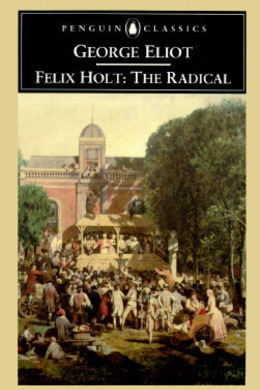
-
EPUB 1.54 MB
-
Kindle 1.06 MB
-
Support epubBooks by making a small $2.99 PayPal donation purchase.
Description
When the young nobleman Harold Transome returns to England from the colonies with a self-made fortune, he scandalizes the town of Treby Magna with his decision to stand for Parliament as a Radical. But after the idealistic Felix Holt also returns to the town, the difference between Harold’s opportunistic values and Holt’s profound beliefs becomes apparent. Forthright, brusque and driven by a firm desire to educate the working-class, Felix is at first viewed with suspicion by many, including the elegant but vain Esther Lyon, the daughter of the local clergyman. As she discovers, however, his blunt words conceal both passion and deep integrity. Soon the romantic and over-refined Esther finds herself overwhelmed by a heart-wrenching decision: whether to choose the wealthy Transome as a husband, or the impoverished but honest Felix Holt.
724 pages with a reading time of ~11 hours (181120 words), and first published in 1866. This DRM-Free edition published by epubBooks, 2014.
Community Reviews
There are currently no other reviews for this book.
Excerpt
On the first of September, in the memorable year 1832, some one was expected at Transome Court. As early as two o’clock in the afternoon the aged lodge-keeper had opened the heavy gate, green as the tree trunks were green with nature’s powdery paint, deposited year after year. Already in the village of Little Treby, which lay on the side of a steep hill not far off the lodge-gates, the elder matrons sat in their best gowns at the few cottage doors bordering the road, that they might be ready to get up and make their courtesy when a travelling carriage should come in sight; and beyond the village several small boys were stationed on the look-out, intending to run a race to the barn-like old church, where the sexton waited in the belfry ready to set the one bell in joyful agitation just at the right moment.
The old lodge-keeper had opened the gate and left it in the charge of his lame wife, because he was wanted at the Court to sweep away the leaves, and perhaps to help in the stables. For though Transome Court was a large mansion, built in the fashion of Queen Anne’s time, with a park and grounds as fine as any to be seen in Loamshire, there were very few servants about it. Especially, it seemed, there must be a lack of gardeners; for, except on the terrace surrounded with a stone parapet in front of the house, where there was a parterre, kept with some neatness, grass had spread itself over the gravel walks, and over all the low mounds once carefully cut as black beds for the shrubs and larger plants. Many of the windows had the shutters closed, and under the grand Scotch fir that stooped toward one corner, the brown fir-needles of many years lay in a small stone balcony in front of two such darkened windows. All round, both near and far, there were grand trees, motionless in the still sunshine, and, like all large motionless things, seemed to add to the stillness. Here and there a leaf fluttered down; petals fell in a silent shower; a heavy moth fluttered by, and, when it settled, seemed to fall wearily; the tiny birds alighted on the walks, and hopped about in perfect tranquillity; even a stray rabbit sat nibbling a leaf that was to its liking, in the middle of a grassy space, with an air that seemed quite impudent in so timid a creature. No sound was to be heard louder than a sleepy hum, and the soft monotony of running water hurrying on to the river that divided the park. Standing on the south or east side of the house, you would never have guessed that an arrival was expected.
But on the west side, where the carriage entrance was, the gates under the stone archway were thrown open; and so was the double door of the entrance-hall, letting in the warm light on the scagliola pillars, the marble statues, and the broad stone staircase, with its matting worn into large holes. And, stronger sign of expectation than all, from one of the doors that surrounded the entrance-hall, there came forth from time to time a lady, who walked lightly over the polished stone floor, and stood on the door-steps and watched and listened. She walked lightly, for her figure was slim and finely formed, though she was between fifty and sixty. She was a tall, proud-looking woman, with abundant gray hair, dark eyes and eyebrows, and a somewhat eagle-like yet not unfeminine face. Her tight-fitting black dress was much worn; the fine lace of her cuffs and collar, and of the small veil that fell backward over her high comb, was visibly mended; but rare jewels flashed on her hands, which lay on her folded black-clad arms like finely-cut onyx cameos.
